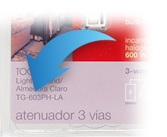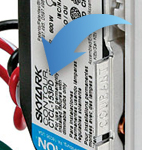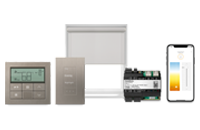Explore Knowledge Articles
test

HomeWorks
For the most uncompromising home integration projects. Equip yourself and your team with the ultimate in design freedom, innovative technology, and reliable quality with HomeWorks.
How do I find my Model Number?
Do you have the original packaging?
-
If your product came in plastic packaging (a clamshell), you’ll find the model number on the front of the insert card, on the lower left corner. If your product came in a box, you’ll find the model number on the top of the box.
Most model numbers are 12-16 characters and start with a couple letters followed by a dash.

No packaging? No problem!
-
The product number is on a label on the side of the dimmer or switch.*
If you’ve already installed the dimmer/switch, turn off the electricity and then remove the wallplate. Unscrew and remove the wallplate adapter, then unscrew the dimmer/switch and pull it out of the wall until you can see the label.
*Please note: The product number for Ariadni/Toggler dimmers is not on a label. It’s located directly on the front of the dimmer on the top left, or right below the on/off toggle.

Get help your way
How do I find my Model Number?
Do you have the original packaging?
-
If your product came in plastic packaging (a clamshell), you’ll find the model number on the front of the insert card, on the lower left corner. If your product came in a box, you’ll find the model number on the top of the box.
Most model numbers are 12-16 characters and start with a couple letters followed by a dash.

No packaging? No problem!
-
The product number is on a label on the side of the dimmer or switch.*
If you’ve already installed the dimmer/switch, turn off the electricity and then remove the wallplate. Unscrew and remove the wallplate adapter, then unscrew the dimmer/switch and pull it out of the wall until you can see the label.
*Please note: The product number for Ariadni/Toggler dimmers is not on a label. It’s located directly on the front of the dimmer on the top left, or right below the on/off toggle.

- Browse Components
-
Applied Filter: Switches > Companion
If you don't know your model number, try browsing for it here
QSM2-*- 0-10V
- Companion
- Electronic Low Voltage
- Fluorescent / LED 3-Wire
- Fluorescent 2-Wire
- Hi-Lume LED 2-Wire
- Incandescent / Halogen
- LED / CFL
- Magnetic Low Voltage
0-10VCompanionElectronic Low VoltageFluorescent / LED 3-WireFluorescent 2-WireHi-Lume LED 2-WireIncandescent / HalogenLED / CFLMagnetic Low Voltage- GRX-PWM
- GRX-TVI
- LQSE-1DAL2-D
- LQSE-2HDC-D
- LQSE-4A1-D
- LQSE-4A5-120-D
- LQSE-4M-120-D
- LQSE-4S8-120-D
- LQSE-4T20-120-D
- LQSE-4T5-120-D
- PHPM-*
PHPM-*- HQR-T*
- HQRA-HN*
- HQRA-W*
- HQRD-HN*
- HQRD-W*
- HQRT-GH*
- HQWA-KP*
- HQWA-W*
- HQWAS-*
- HQWD-W*
- HQWT-S*
- HQWT-U*
- HRST-HN
- HRST-W
- HW-NW-KP*
HQR-T*HQRA-HN*HQRA-W*HQRD-HN*HQRD-W*HQRT-GH*HQWA-KP*- HQWA-W1BI
- HQWA-W1BN
- HQWA-W1RLDI
- HQWA-W1RLDN
- HQWA-W2BSI
- HQWA-W2BSN
- HQWA-W2RLDI
- HQWA-W2RLDN
- HQWA-W3BDI
- HQWA-W3BDN
- HQWA-W3BSI
- HQWA-W3BSN
- HQWA-W3BSRLI
- HQWA-W3BSRLN
- HQWA-W4BSI
- HQWA-W4BSN
- HQWA-W4SI
- HQWA-W4SN
- HQWA-W5BI
- HQWA-W5BIRI
- HQWA-W5BIRN
- HQWA-W5BN
- HQWA-W5BRLI
- HQWA-W5BRLN
- HQWA-W6BI
- HQWA-W6BN
- HQWA-W6BRLI
- HQWA-W6BRLN
- HQWA-W7BI
- HQWA-W7BN
HQWA-W*HQWAS-*HQWD-W*HQWT-S*HQWT-U*HW-NW-KP*- Accessories
- HQ-LV21-120
- HWR-PD-8-120FT
- L-LV14-120
- PD10-65T-DV
- PD2*
- PD4*
- PD5-36F-120
- PD6-42T-DV
- PD8-*
- PD9-59F-120
AccessoriesPD2*PD4*PD8-*AccessoriesPico WirelessAccessoriesCeiling MountMullion MountWall MountWindow MountCompanionMaster -

HomeWorks


-
Can I upgrade customers' Homeworks Illumination systems to HomeWorks?
Yes, it is possible to upgrade from HomeWorks Illumination to HomeWorks QSX. There is a database conversion tool available on myResources which helps to minimize the software work required during the upgrade process by retaining most of the Design and Program tab contents.
On the hardware side, legacy panelized equipment (RPM and Specification Grade Panels) can communicate to a QSX processor, on the QS Link, using the Panel Link to QS Link Translator (HQ-MI-LX). Optionally, RPM panelized equipment can be replaced by DIN Rail equipment with the help of the RPM to DIN subplate (PD8-PNL-8-SUB). All other legacy hardware must be replaced including keypads and QED shades.
For more information, refer to Application note #840. -
How can I control 0-10V lighting with HomeWorks?
You have three options for controlling 0-10V lighting:
- You can use a 0-10V dimming DIN module such as the LQSE-4T5-120-D or the LQSE-4T20-120-D.
- You can use GRX-TVI interfaces to convert line voltage dimming to 0-10V dimming. You can use this interface with controls such as local in-wall dimmers, WPMs, and RPMs.
- If there is an RF link available in the project, you can use the LMJ-5T-DV-B to switch the line voltage and provide the 0-10V dimming signal. This device is normally mounted out of sight in a junction box knockout.
-
How do I find somebody in my area that can help me with my system?
For a list of certified dealers in your area, visit our Where To Buy tool. Enter your zip code, then select "RadioRa 2".
-
How do I integrate HomeWorks with RS-232 devices?
An Ethernet to RS-232 converter device is required to communicate with RS-232 devices from a HomeWorks system since there is no on-board serial port. There are many devices with these capabilities, however, we've had success with the following: Digi One SP and B & B Electronics ES1A.
The converter device must open and maintain a Telnet session with the HomeWorks system, which will then allow the Lutron Integration Protocol data to pass through to the RS-232 port. For instructions on properly configuring this connection, please log in to your myLutron account and the follow this link. -
Where can I find maximum wire run distances, device count limits, and other system specifications?
Refer to the HomeWorks section of the System Rules Document (pages 6-7). You can also log in to your myLutron account and visit the Service and Support section of lutron.com. There you will find Application Notes along with Product Specification Submittals.


Looking for other products?
No Results Found! Please enter valid model number to search.
How do I find my Model Number?
Do you have the original packaging?
-
If your product came in plastic packaging (a clamshell), you’ll find the model number on the front of the insert card, on the lower left corner. If your product came in a box, you’ll find the model number on the top of the box.
Most model numbers are 12-16 characters and start with a couple letters followed by a dash.

No packaging? No problem!
-
The product number is on a label on the side of the dimmer or switch.*
If you’ve already installed the dimmer/switch, turn off the electricity and then remove the wallplate. Unscrew and remove the wallplate adapter, then unscrew the dimmer/switch and pull it out of the wall until you can see the label.
*Please note: The product number for Ariadni/Toggler dimmers is not on a label. It’s located directly on the front of the dimmer on the top left, or right below the on/off toggle.















